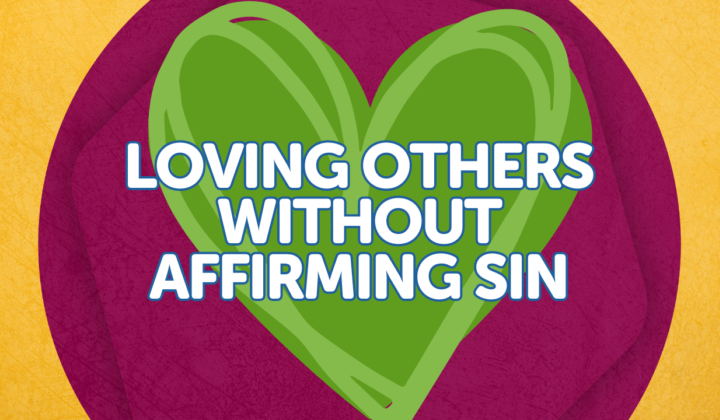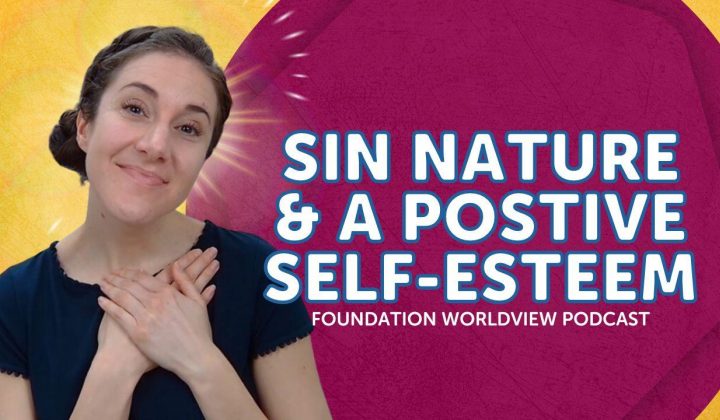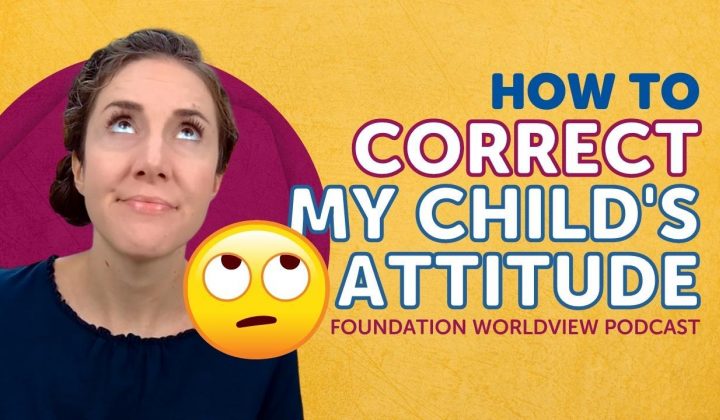Learn more about the journey that led to us equipping kids to carefully evaluate every idea they encounter.
Meet members of our team who have contributed to curriculum development.
Hear from real users of the Foundation Curriculum.
Learn what we believe about God, Jesus, Scripture, and more.
Teaching Kids Grace Without Giving License to Sin
In this episode, Elizabeth Urbanowicz dives into a powerful question: How can parents teach kids about God's grace without inadvertently allowing a permissive view on sin? Using biblical examples and principles from the New Testament, she guides parents on teaching the concepts of grace, repentance, and right living in a way that nurtures both understanding and respect for God’s truth. Tune in to learn practical tips on instilling both right beliefs and actions within your family.
Transcript
Note: The following is an auto-transcript of the podcast recording.
Hello, friends. Today's podcast question says, "how do I teach my children about God's grace without giving them license for sexual sin?" This is a really important question and a really good one and exciting one because this is exactly what God's word teaches. God's word is very clear about God's grace. Yet the biblical authors never give us a license for any type of sin. And so that's what we're going to dive down deep into today on the Foundation Worldview Podcast where we seek to answer your questions so that you can equip the children that God has placed in your care to carefully evaluate every idea they encounter and understand the truth of the biblical worldview. I'm your host, Elizabeth Urbanowicz, and I'm thrilled that you've joined me for this episode today.
Now, what we're going to do in this podcast as we look at how do we teach our children about God's grace without giving them a license for sexual sin, we are going to take the same exact approach as the New Testament writers. I don't know if you've ever noticed this theme flowing throughout the New Testament epistles, but in the letters that are written to the churches and to individuals in the New Testament. Those letters written, especially those written by the Apostle Paul, follow this one specific, I don't want to call it formula because it's not like a formula, but there's this one very clear pattern in almost all of the Apostle Paul's letters and in some other letters as well. And that specific pattern is first the writer covers orthodoxy in the first half of the letter, and then in the second half of the letter moves into orthopraxy. And so orthodoxy and orthopraxy are just fancy terms that mean right belief and right living. So orthodoxy is right belief, orthopraxy is right living. So in so many of the New Testament epistles, first the author covers what is the right thing for you to believe, and then the second half of the letter is, how is the right way for you to live? So this is the same exact model that we should use with our children.
So first we want to cover with them what are right biblical beliefs. Now, anytime we're talking about right biblical beliefs, we don't want to just talk with our children about these things. We want to ground them in Scripture. So we want to take them directly to Scripture. So the first thing we're going to look at are what are right beliefs about sin. Now, there are so many passages of Scripture that we can take our kids to, and so I would encourage you just to look through the scriptures and look at different passages that talk about sin. I've specifically pulled up two passages of Scripture that I think are important to cover with our children. And so the first passage is Psalm 51 verses three through four. Now, this is the psalm where David is talking about his sin with Bathsheba and Uriah. Okay? So having sex with Bathsheba and then killing her husband, Uriah in Psalm 51 verses three to four says, "For I know my transgressions, and my sin is ever before me. Against you, you only, have I sinned and done what is evil in your sight, so that you may be justified in your words and blameless in your judgment." So we can read this passage with our children. If you want to, you can read all of Psalm 51 and then ask them what truth about sin is revealed in this passage. Now, this passage might seem a little bit confusing because if we're thinking in the context of David sinning against Bathsheba by having sex with her outside of the covenant of marriage, and then David sinning against Uriah by having him killed to cover up David's sin, and then David says to God against you, you only have I sinned and done what is evil in your sight. That might seem a little confusing, but it reveals a very important truth that our sin is an offense against God, that yes, we can sin against others, others can sin against us. That is a hurt that is not right. However, sin is primarily an offense against God, so that when we are sinning, we are first and foremost sinning against God, our creator and sustainer. So that's what we want to help our children understand from this passage that sin is primarily an offense against God, the king of the universe.
Another passage we can take our kids to is Isaiah chapter 59 verses one and two, and this passage says, "Behold, the Lord's hand is not shortened, that it cannot save, or his ear dull, that it cannot hear; but your iniquities have made a separation between you and your God, and your sins have hidden his face from you so that he does not hear." So we can take our children to this passage and say, okay, what truths about our sin and God are revealed in this passage? And this passage clearly reveals that sin separates us from God, that our sins have hidden his face from us. So from these two passages, we get that sin is an offense against God and it separates us from God. So these are two things that we want our children to clearly understand. So this is the orthodoxy, the right belief.
Then we want to look at, okay, what is the orthodoxy, the right belief about grace. Because Scripture talks about both of these things, our sin and God's grace. And so again, I've pulled out two passages that I think are key for us to take our children through. However, these are by no means the only two passages that talk about God's grace. So just highly recommend that you dive down into God's word and you think through, okay, what are the important passages for me to take my children to?
The first passage that I've pulled out for us is Romans chapter three, verses 21 through 24. And this passage says, "But now the righteousness of God has been manifested apart from the law, although the Law and the Prophets bear witness to it- the righteousness of God through faith in Jesus Christ for all who believe. For there is no distinction: for all have sinned and fall short of the glory of God, and are justified by his grace as a gift, through the redemption that is in Christ Jesus." So we want to read this passage with our children and then say, okay, what truths about God's grace are revealed in this passage? And again, we might have to read through these passages multiple times with our children because very few of us can comprehend on just one reading everything a passage says. So after we've read through this passage a couple times, then talk through what truths are revealed about God's grace. Well, very clearly in this passage we see that God's grace is offered freely through Jesus, that it's the finished work of Jesus that allows us to receive God's grace. Okay? So first we want our kids to understand that God's grace is offered freely through Jesus.
Another passage that we can take our kids to is Romans chapter five, verses 20 through 21. And this passage reads "Now the law came in to increase the trespass, but where sin increased, grace abounded all the more, so that, as sin reigned in death, grace also might reign through righteousness leading to eternal life through Jesus Christ, our Lord." And we can ask our kids, okay, what does this passage reveal about God's grace? This passage reveals that God's grace reigns and that means that God's grace is greater than our sin, that there is not a struggle of which is going to be stronger, our sin or God's grace. That God's grace reigns death, no longer reigns, sin no longer reigns, God's grace reigns. So God's grace is greater than our sin. Okay? So that's the orthodoxy, the right belief about God's grace, that God's grace is freely offered through Jesus and it is greater than our sin. Okay, so we just covered the orthodoxy looking at sin and grace.
Now we want to move into the orthopraxy, the right living. So what is right, living regarding sin and grace? And again, we can take our kids to multiple passages in Scripture, but I've pulled up two that I think speak both to our sin and to God's grace and what the proper response is to them. And the first passage is John 14 verse 15, and this is Jesus talking to his disciples and he says, "If you love me, you will keep my commandments." And we can ask our children, okay, what truths are revealed in this passage? Well, this verse reveals that our love for God should lead us to obey him, that if we truly love God, we will obey him.
Then another passage that we can take our children to is first John chapter one verses eight and nine. And this passage says, "If we say we have no sin, we deceive ourselves, and the truth is not in us. If we confess our sins, he is faithful and just to forgive us our sins and to cleanse us from all unrighteousness." And we can ask our children, okay, what truths are revealed from this passage? Well, first that we are sinners. That's the first truth revealed. Sorry. Verse eight says, "If we say we have no sin, we deceive ourselves and the truth is not in us." So we are all sinners. We are going to sin. But then the next truth that is revealed is the proper response when we sin is to confess of that sin, repent of it, and turn to Jesus. Okay? So in this right living, we want our kids to understand that if we truly love God, that love will lead us to obey him. That we don't obey God just out of a desire to be approved, because our obedience does not lead to approval. It's only the obedience of Christ. His obedience led to our approval. But if we love him, that love should lead us to obey God. So we should want to obey God's commands. We should want to remain faithful sexually, to not lust after others, to not take the gift of sex outside of the covenant of marriage. But when we do sin, when we do lust, if we do go farther than we should physically or take the gift of sex outside of marriage, that the proper response is confession and repentance and turning to Jesus. So this is how we can cover with our kids the orthodoxy, the right belief and the orthopraxy, the right living.
And then just some practical steps at home to just get this idea of right belief and living about sin and God's grace. We just need to make sure that we are practicing confession and repentance in our home. That when our children sin against us or one another, or when we sin against them or we sin against our spouse, that we're not just sweeping it under the rug. We're not just doing nice things to try to make up for it, but we're actually confessing our sin. We're sitting down and we're saying, I did this to you. This was wrong. I'm so sorry. Will you please forgive me. So that we're walking our kids continually through this practice of confession and repentance. Now, for those of you who are in the trenches with little ones or middle-aged kids or teenagers, just know that this practice of confession and repentance, it can take a long time to stick. Our kids probably will not like it. They might roll their eyes, but as we are continuing to walk through this process, we're getting them slowly in the habit of making confession a way of life because confession and repentance, these are the way of the Christian life. The call to Jesus is to repent. Repent, to turn from our sin.
Another thing we need to make sure that we're doing is as we're disciplining our children, we need to be consistent with the standards and expectations that we have, and we need to make sure that we're not focusing solely on behavior modification. That yes, we do want our children to understand that what they did was wrong and they should not do it again. However, we want to focus on the gospel, okay? That this is a sin that separates you from God, that the sin needs to be confessed and repented of. And when we repent, God's grace in Jesus is greater than all of our sin, and it is offered freely.
We also want to make sure as we're thinking about our children obeying Jesus, we want that obedience to come out of a love for him. Now, we cannot change our children's hearts. We cannot develop in them a love for Jesus that only God can take a heart of stone and turn it into a heart of flesh. But what we can do is make sure that we have the elements of growth in place in our homes. So we need to make sure that the practices of our homes, the daily rituals and routines are centered around God and his word, that we are turning to God continually in prayer. That we are praising him, that when we're doing things, even things like baking cookies, we're like, isn't it amazing that God just created these different types of food that we can actually put together and we can make into this delicious cookie or whatever we're baking. And just making sure that our kids, that their minds and hearts are always focused on who God is. And we want them to understand that every time we sin, it's a question of who do we love more? Do we love God or do we love ourselves? And many times, we are going to choose ourselves because we still will wrestle with the flesh until the day we die or the day Jesus returns home. But when we do choose to love ourselves rather than loving God, the proper response for a Christian is confession and repentance, and then we freely receive the grace that God has offered us in Jesus and that grace that is greater than our sin.
Well, that's a wrap for this episode. But if you have a question that you would like for me to answer on a future Foundation Worldview podcast, you can submit that question by going to FoundationWorldview.com/podcast. Also, ask that you would invest the few seconds that it takes to rate and review this comment, or if you're watching on YouTube that you click the thumbs up button and leave a comment. All of those are things that just help us get this content out to more Christian adults so we can equip even more Christian parents and educators and ministry leaders to get the kids in our care to think carefully and understand the truth of the biblical worldview.
My prayer for you as we leave this time together is that no matter the situation in which you and the children God has placed in your care, find yourselves that you would trust that God is working all things together for your good. By using all things to conform you more into the image of His Son. I'll see you next time.
Related Posts and insights

Loving Others Without Affirming Sin
In this episode, we dive into the challenging question: how can we teach our children to love others as image-bearers of God while recognizing sin without condoning it? Elizabeth Urbanowicz explores how to balance grace and truth, offering biblical insights to help parents guide their children through this delicate issue. Tune in to learn practical ways to train your children in love, discernment, and understanding the truth of God's Word.

Talking To Kids About Their Sin Nature without Damaging Their Self-Esteem
In this episode of the Foundation Worldview podcast, host Elizabeth Urbanowicz answers a question that many Christian parents may have: how do we teach young children about their value and worth to God while also discussing the concept of sin?

How to Correct My Child's Attitude
Do your children get annoyed when you bring up the things of God? In this week's episode, Elizabeth Urbanowicz talks about how we can appropriately engage and correct our children's attitudes without feeling overbearing.




